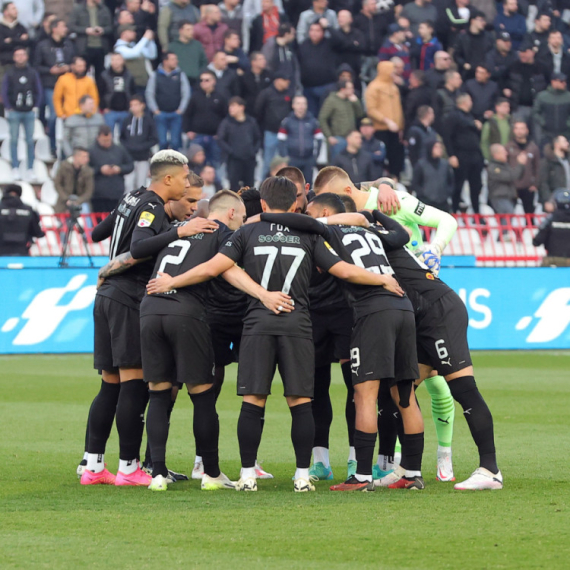Conviction of journalist's killer in Ukraine welcomed by IFJ
The International Federation of Journalists (IFJ) today hailed as a step to end impunity in Ukraine the conviction of General Oleksiy Pukach.
Thursday, 31.01.2013.
20:15

BRUSSELS The International Federation of Journalists (IFJ) today hailed as a step to end impunity in Ukraine the conviction of General Oleksiy Pukach. Pukach was found guilty ofthe murder of Georgy Gongadze by a court in Kiev on January 29. The Federation joined its affiliates in Ukraine and Europe in welcoming the decision which capped a long and hard campaign waged by journalists and the journalist's family. Conviction of journalist's killer in Ukraine welcomed by IFJ "After more than a decade of tireless pursuit of justice for Gongadze, the conviction of his killer is good news indeed," said Jim Boumelha, IFJ President. "Unfortunately, the decision feels like partial justice as others involved in his murder are still being shielded from responsibility." Ukraine media reported that the court found General Pukach, a former chief of surveillance department in the Interior Ministry, guilty of strangling the journalist and sentenced him to life imprisonment. The defendant, who confessed to the killing in 2009, told the court the murder had been ordered by former President Leonid Kuchma, his former chief of staff Volodymyr Lytvyn and former Interior Minister Yuriy Kravchenko who died in 2005 in suspicious circumstances. Prosecutors brought charges against Kuchma in 2011 but dropped them, citing lack of evidence. Pukach's trial was held behind closed doors, restricting access of families to court hearings and raising suspicions of a cover up. Georgy Gongadze, publisher of the Internet journal Ukrainska Prawda, was kidnapped on September 16, 2000 and his body found later beheaded. The journalist had been investigating corruption at senior levels of the Ukrainian government led by former President Leonid Kuchma. Revelations of secret tape recordings of Kuchma ordering Interior Ministry' services to kill Gongadze sparked accusations of his involvement. The IFJ spearheaded journalists' campaign to have his killers face justice and its European group, the European Federation of Journalists, has warned that failure to hold all suspects in Gongadze's murder would delay further the true rule of law in Ukraine. The IFJ/EFJ is opposed to the idea of holding a Court in a closed mode, which may give reasons to doubt the fairness of the sentence, and they call for greater openness in the proceedings. "We urge the authorities to reconsider their decision not to prosecute other individuals mentioned by Pukach," added Arne König, EFJ President. "They should answer for their role in a public and transparent trial. It is the only way to do justice to Gongadze and allow his family to move on." In Belgrade, a newly formed commission that will consider similar cases in Serbia also welcomed the outcome of the trial. Commission's chair Veran Matic stated that the Ukrainian case was an inspiration to set up the commission in Serbia, and that the concentrated effort of domestic journalists in cooperation with the institutions of the system and support of international institutions and experts played a great role: "This was the reason to discuss a similar model with then Council of Europe Human Rights Commissioner Thomas Hammarberg, that had an active role in discovering who killed colleague Gongadze, and from which, effectively, today's commision was made. I hope we will have the same results in finding who the killers were and, of course, with the court outcome." Oleksiy Pukach, left, in a defendant's cage on the final day of his trial in Kiev (Beta/AP) B92 IFJ
Conviction of journalist's killer in Ukraine welcomed by IFJ
"After more than a decade of tireless pursuit of justice for Gongadze, the conviction of his killer is good news indeed," said Jim Boumelha, IFJ President. "Unfortunately, the decision feels like partial justice as others involved in his murder are still being shielded from responsibility."Ukraine media reported that the court found General Pukach, a former chief of surveillance department in the Interior Ministry, guilty of strangling the journalist and sentenced him to life imprisonment.
The defendant, who confessed to the killing in 2009, told the court the murder had been ordered by former President Leonid Kuchma, his former chief of staff Volodymyr Lytvyn and former Interior Minister Yuriy Kravchenko who died in 2005 in suspicious circumstances.
Prosecutors brought charges against Kuchma in 2011 but dropped them, citing lack of evidence. Pukach's trial was held behind closed doors, restricting access of families to court hearings and raising suspicions of a cover up.
Georgy Gongadze, publisher of the Internet journal Ukrainska Prawda, was kidnapped on September 16, 2000 and his body found later beheaded. The journalist had been investigating corruption at senior levels of the Ukrainian government led by former President Leonid Kuchma. Revelations of secret tape recordings of Kuchma ordering Interior Ministry' services to kill Gongadze sparked accusations of his involvement.
The IFJ spearheaded journalists' campaign to have his killers face justice and its European group, the European Federation of Journalists, has warned that failure to hold all suspects in Gongadze's murder would delay further the true rule of law in Ukraine. The IFJ/EFJ is opposed to the idea of holding a Court in a closed mode, which may give reasons to doubt the fairness of the sentence, and they call for greater openness in the proceedings.
"We urge the authorities to reconsider their decision not to prosecute other individuals mentioned by Pukach," added Arne König, EFJ President. "They should answer for their role in a public and transparent trial. It is the only way to do justice to Gongadze and allow his family to move on."
In Belgrade, a newly formed commission that will consider similar cases in Serbia also welcomed the outcome of the trial.
Commission's chair Veran Matić stated that the Ukrainian case was an inspiration to set up the commission in Serbia, and that the concentrated effort of domestic journalists in cooperation with the institutions of the system and support of international institutions and experts played a great role:
"This was the reason to discuss a similar model with then Council of Europe Human Rights Commissioner Thomas Hammarberg, that had an active role in discovering who killed colleague Gongadze, and from which, effectively, today's commision was made. I hope we will have the same results in finding who the killers were and, of course, with the court outcome."


























































Komentari 0